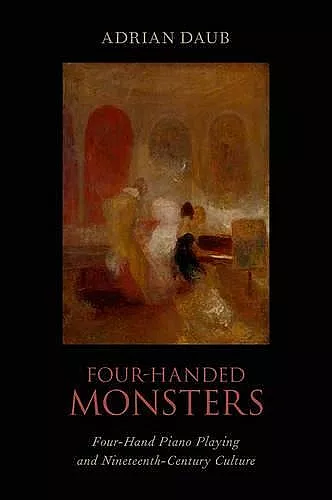Four-Handed Monsters
Four-Hand Piano Playing and Nineteenth-Century Culture
Format:Hardback
Publisher:Oxford University Press Inc
Published:19th Jun '14
Currently unavailable, and unfortunately no date known when it will be back

In the course of the nineteenth century, four-hand piano playing emerged across Europe as a popular pastime of the well-heeled classes and of those looking to join them. Nary a canonic work of classical music that was not set for piano duo, nary a house that could afford not to invest in them. Duets echoed from the student bedsit to the Buckingham Palace, resounded in schools and in hundreds of thousands of bourgeois parlors. Like no other musical phenomenon it could cross national, social and economic boundaries, bringing together poor students with the daughters of the bourgeoisie, crowned heads with penniless virtuosi, and the nineteenth century often regarded it with extreme suspicion for that very reason. Four-hand piano playing was often understood as a socially acceptable way of flirting, a flurry of hands that made touching, often of men and women, not just acceptable but necessary. But it also became something far more serious than that, a central institution of the home, mediating between inside and outside, family and society, labor and leisure, nature and nurture. And writers, composers, musicians, philosophers, journalists, pamphleteers and painters took note: in the art, literature and philosophy of the age, four-hand playing emerged as a common motif, something that allowed them to interrogate the very nature of the self, the family, the community and the state. In the four hands rushing up and down the same keyboard the nineteenth century espied, or thought espy, an astonishing array of things. Four-Handed Monsters tells the story of that practice, but also the story of the astonishing array of things the nineteenth century read into it.
"What a delight! Adrian Daub has written the cultural history of a long-neglected and much-maligned medium of musical performance that at one time was cultivated in just about every bourgeois household. If four-hand piano playing regains renewed interest in our own age of mechanical reproduction, we will have Adrian Daub partly to thank." --Thomas Christensen, Professor of Music and the Humanities, University of Chicago "Adrian Daub is a peerless and stimulating exegete of the 'four-handed monster': he brilliantly and meticulously excavates the cultural, social, and aesthetic traces of a vital nineteenth-century musical practice." --Jeffrey Kallberg, Associate Dean for Arts & Letters and Professor of Music History, University of Pennsylvania
ISBN: 9780199981779
Dimensions: 236mm x 155mm x 23mm
Weight: 476g
256 pages